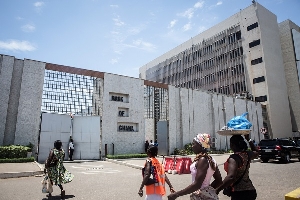Yaw Appiah Lartey, Deloitte Africa Head, Infrastructure and Capital Projects Ghana says government needs policies that identify and create opportunities for the diaspora to increase remittances to support Ghana’s economy.
He said such a policy must be underpinned by a strategy that would deepen financial inclusion, reduce remittance costs, and leverage digital technology.
Speaking at the Graphic Business Stanbic Bank Ghana Breakfast Meeting on the theme, “The Remittance System- impact on the economy” he said Ghana’s position as the second country with the highest remittances in Sub Saharan Africa, stands threatened due to the significant innovation that other countries have adopted.
He said that while Ghana’s remittance grew at an average rate of 5 per cent, countries such as Mozambique, Rwanda and Ethiopia are growing at a rate of 48 per cent, 16, per cent and 16 per cent, respectively.
Those growth rates, Mr. Lartey explained, were influenced mainly by labour migration and targeted policies at the diaspora to invest in home country.
He highlighted the need to synchronise all licensing regimes within the remittance space to reduce bureaucracy and avoid undue delay.
Mr. Reynell Badoe, Head, Everyday Banking at Stanbic Bank, said even though Ghana had good policies on the remittances ecosystem, some work was needed in monitoring remittance that comes into the country.
He said variations in remittance figures captured domestically by the Central Bank and internationally by the World Bank might suggest existing loopholes in data capturing which should be of concern.
“You have a situation where even though we are recording a huge amount of forex coming into the country, we may see that we are recording huge but when you look at the report itself, what actually comes in a smaller,” he said.
Dr Richmond Atuahene, economist and banking consultant said it was time the country considered remittances as “super gold” for the economy.
“Between 2014 to 2023, Ghana earned $28.6 billion over a 10-year period as against Cocoa which gave us $18.7 billion,” he said.
According to the Bank of Ghana, Ghana recorded $4.8 billion as remittance for 2023, while $4.6 billion was recorded in 2022.
Most of the remittances go to support education, health, housing, and construction.
Business News of Thursday, 22 August 2024
Source: GNA













